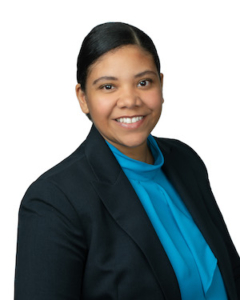 Iris Colón names her biggest learning moment as being able to recognize the power in your own voice, especially as a woman of color.
Iris Colón names her biggest learning moment as being able to recognize the power in your own voice, especially as a woman of color.
That confidence often comes from accumulated knowledge, but since she has been fortunate to work in a wide variety of industries, she knew that she couldn’t have amassed as much industry knowledge as others; however, that didn’t make her opinions less valid.
“Even if someone had more longevity, I can speak from different perspectives, which is especially important in today’s climate,” she says, adding that she also likes to be the voice for others who feel there is too much risk to speak up or take action. She learned to advocate for herself as a teenage cancer survivor.
Pivoting Among Industries
”Winding, with some roundabouts” is how Colón describes her career path. Her first role out of college was as an assistant at a nonprofit working to improve afterschool programs by enhancing the skills of afterschool staff. She believes being discovered for the role was serendipity as she had applied online, and by coincidence, the CFO had been the program director of an afterschool program she had attended many years ago and recognized her name. Then, she was interviewed by someone who had attended her college and lived in Washington Heights where she grew up.
After her stint there, Colón went to work in NYC government on workforce development, first holding positions as an analyst and then a manager. Her next pivot was to technology since she had planned to move to Connecticut, and many New York City agencies require you to be a resident. She was able to land the job because of her transferrable skills in data management, which she had performed for all the workforce development programs. While there, she pursued her MBA while working fulltime.
After graduation, Colón decided to seek consulting roles with a human component and took a position with a healthcare company, where she helped implement multiple organizational changes, such as the Fully Integrated Duals Advantage (FIDA) program. Then as the firm confronted transformation, she decided it was a good time for her to seek other opportunities.
She held a client-facing role at McLagan an Aon company for three years, where she worked with fintech firms helping them establish their vision and HR initiatives, as well as with major financial companies in the Caribbean. Now she is at BDO, working on a team focused on Strategy, Operational Efficiency, Mergers & Acquisitions, and Learning & Development for the Advisory division.
As she has moved between roles, she has always prioritized finding a company that lives its values. To help assess that, she treats interviews as a two-way fact-finding mission, asking how they treat employees of all races and genders.
Her proudest professional achievement encompasses two facets: She is proud of her workforce history where she’s been able to adapt to so many types of industries, with a personality that lends itself to be a good fit with a wide variety of people and projects. However, she’s also proud of her education. As a Latina, graduating from college as a first-generation student was an amazing achievement, and then earning her MBA, as one of the few women in her classes, and also taking a leadership role in student government while she was at NYU Stern.
Giving Back is Part of her Nature
Colón believes strongly in the value of mentors. When she graduated from high school, she was awarded a scholarship and partway through her college experience she was assigned a mentor who could help her through her schooling and choosing her major. But Colón adds that she wishes she’d had more mentors who looked like her and shared similar experiences and backgrounds. Nevertheless, she says she was fortunate to have had multiple female bosses, and therefore was able to note qualities that were both good and bad to emulate or avoid.
Sometimes she believes women can see each other as competition, which can hamper a working relationship. She found it vital to identify a boss who was supportive of what she wanted to do and saw her potential and then was willing to help her grow. “Your boss needs to be an advocate for you and show they want you on the team,” she says.
Currently, Colón is active in her firm’s Multicultural Alliance that helps to plan events and also makes sure that company leaders back up their words with actions related to diversity and inclusion. Outside of her firm she gives back to organizations that have been important to her, such as the Women’s Bond Club, where she initially received her scholarship. The group has since expanded its programming to include internships and mentoring and now awards multiple scholarships.
She also participates in several alumni groups connected to NYU, including the Black and Latino Alumni Group of NYU Stern and NYU Alumni Club in Connecticut, and Haverford College, Multicultural Alumni Action Group. As a young adult cancer survivor, she is part of the First Descents and Stupid Cancer communities.
As a native New Yorker, she never anticipated moving to Connecticut, but enjoys a full life there with her husband, Anthony, and three-year-old son, Justin. And now she shares her newfound love with others, as a member of the Newcomers Club of New Canaan’s social committee dedicated to helping new residents connect with each other and get involved in the town.
“Diversity can infuse every part of your life,” she says.
by Cathie Ericson


